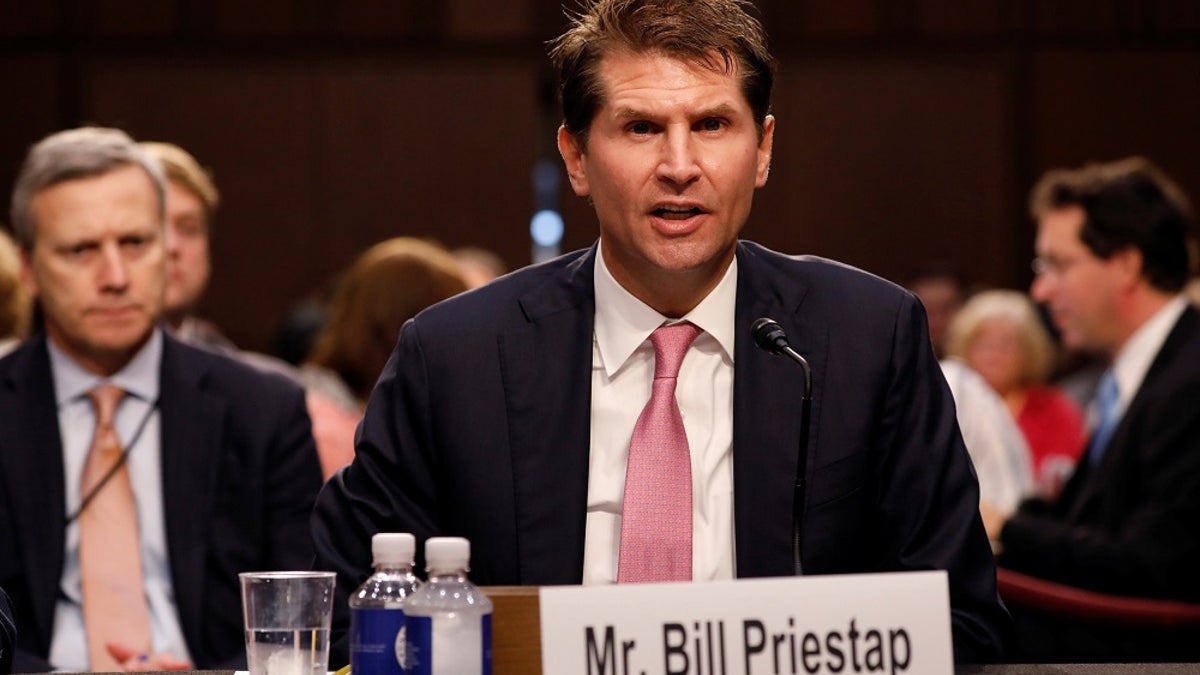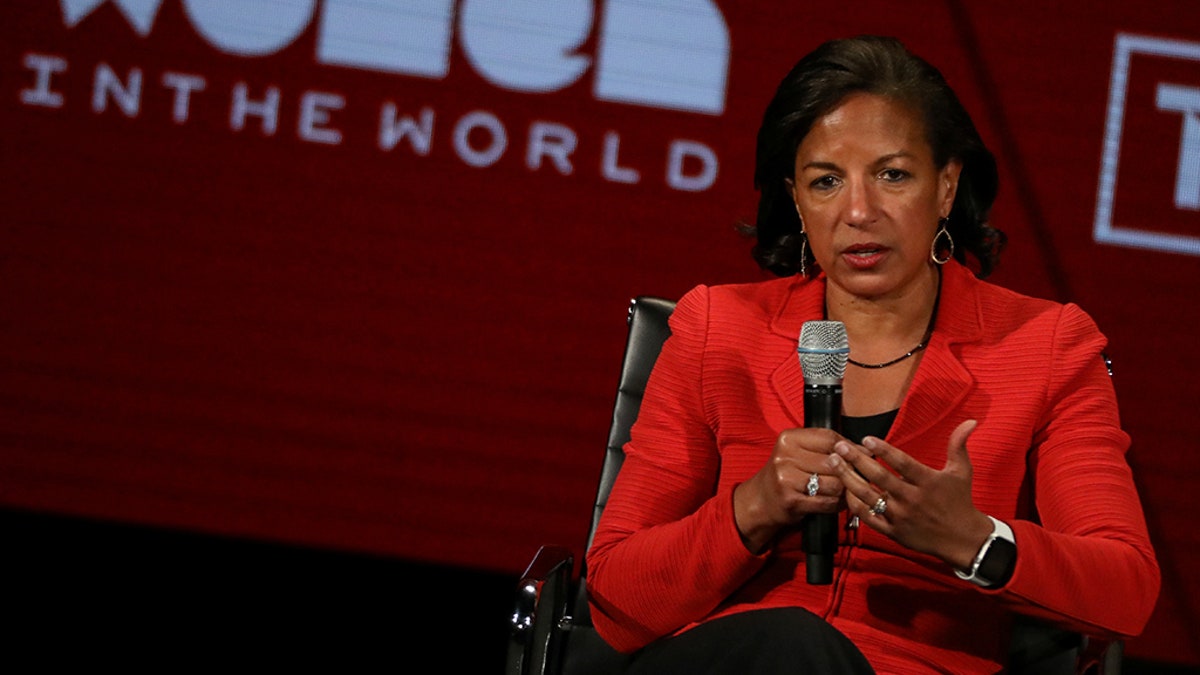Tucker: Susan Rice and the origins of the Russia investigation
On January 20, the last day of the Obama administration, outgoing National Security Adviser Susan Rice stat down to write her final memo.
After weeks of bombshell revelations highlighting apparent FBI misconduct in the cases of former Trump aide Carter Page and former National Security Adviser Michael Flynn, the Republican-controlled Senate on Monday took two major steps toward launching its own comprehensive probe into the matter -- even as the Justice Department's separate criminal investigation, led by U.S. Attorney John Durham, continues.
Senate Judiciary Committee Chairman Lindsey Graham, R-S.C., specifically announced Monday that his panel will soon vote on a subpoena authorization related to the FBI's apparent surveillance abuses. In a contentious interview, Graham recently told Fox Business' Maria Bartiromo that Republicans would conduct a proper investigation, but he was wary of interfering with the DOJ's "ongoing criminal matter," referring to Durham's review.
Graham's office announced in a statement that his subpoena authorization "covers a number of documents, communications and testimony from witnesses, including [former FBI Director] James Comey, [former FBI Deputy Director] Andrew McCabe, [former Director of National Intelligence] James Clapper, [former CIA Director] John Brennan, [former Deputy Attorney General] Sally Yates and others."
A total of 53 other names were on the list of potential subpoena recipients, including: "Trisha Anderson, Brian Auten, James Baker, William Barr, Dana Boente, Jennifer Boone, Kevin Clinesmith [the FBI lawyer who allegedly falsified a CIA email to secure the Carter Page FISA warrant], Patrick Conlon, Michael Dempsey, Stuart Evans, Tashina Gauhar [a top DOJ deputy when classified details of Flynn's calls with the Russian ambassador were illegally leaked to The Washington Post], Carl Ghattas, Curtis Heide, Kathleen Kavalec, David Laufman [who arranged a key meeting with a Steele dossier source], Stephen Laycock, Jacob Lew, Loretta Lynch, Mary McCord, Denis McDonough, Arthur McGlynn, Jonathan Moffa, Sally Moyer, Mike Neufield, Sean Newell, Victoria Nuland, Bruce Ohr, Nellie Ohr, Stephanie L. O’Sullivan, Lisa Page, Joseph Pientka [who interviewed Flynn at the White House while also playing a key role in the Carter Page probe, and whom the FBI has hidden from scrutiny], John Podesta, Samantha Power, E.W. “Bill” Priestap [who authored the memo debating whether the bureau simply wanted Flynn "fired"], Sarah Raskin, Steve Ricchetti, Susan Rice, Rod Rosenstein, Gabriel Sanz-Rexach, Nathan Sheets, Elizabeth Sherwood-Randall, Glenn Simpson, Steve Somma [an FBI case agent who apparently was involved in several key FISA omissions], Peter Strzok, Michael Sussman, Adam Szubin, Jonathan Winer, and Christopher Wray."
SO MUCH FOR THAT: MEDIA 'EXPERTS' PREVIOUSLY ASSURED US THAT FISA PROCESS WAS ROBUST
Priestap authored a handwritten memo that openly questioned if the FBI's "goal" in interviewing Flynn was "to get him to lie, so we can prosecute him or get him fired" -- a document that the feds turned over earlier this month, even though the DOJ had been under an obligation to turn over potentially exculpatory materials to Flynn for more than two years.
Documents also revealed that Strzok, the anti-Trump FBI agent who also participated in the Flynn interview, pushed to keep the Flynn probe alive even though the FBI's Washington field office wanted to close the case.
The DOJ revealed late Monday that it has produced the bureau's May 5 interview of Preistap, although the interview notes have remained under seal for now.

Bill Priestap testifying in 2017 during a hearing into alleged collusion between Russia and the Trump campaign. (Reuters, File)
Fox News previously determined that Pientka, who is on Graham's subpoena list, also was intimately involved in the Carter Page case, which the DOJ has since acknowledged was riddled with fundamental errors and premised on a discredited dossier that the bureau was told could be part of a Russian disinformation campaign.
Pientka conspicuously was removed from the FBI's website after Fox News contacted the FBI about his extensive role in Crossfire Hurricane Foreign Intelligence Surveillance Act [FISA] matters -- a change first noticed by Twitter user Techno Fog -- but sources said Pientka remained in a senior role at the agency's San Francisco field office. Republicans previously sought to question Pientka, beginning in 2018. On Monday, the FBI declined to provide any additional comment.
Debate on Graham's measure is set to start May 21, and a vote is expected June 24. Judiciary Committee subpoenas would require either the consent of the ranking Democrat or a full vote of the committee.
MUELLER PROSECUTOR BOOTED FROM FLYNN CASE AFTER QUESTIONS EMERGE ABOUT COMPLIANCE W/ COURT ORDER
Also Monday, Senate Homeland Security Chairman Ron Johnson, R-Wis., requested that the Justice Department turn over an unredacted copy of the email that former National Security Adviser Susan Rice sent to herself on Inauguration Day -- a document that could shed light on the secretive January 5, 2017 White House meeting in which then-President Obama shocked a top DOJ official with his knowledge of the FBI's Flynn probe.
"I understand your office is currently reviewing a January 20, 2017, email from former National Security Adviser Susan Rice," Johnson wrote to Attorney General Bill Barr. "In that email, Ambassador Rice summarized an Oval Office meeting with President Obama and other administration officials that occurred on January 5, 2017."

Former National Security Adviser and U.S. Ambassador to the U.N. Susan Rice in April 2019.
Johnson continued: "A majority of Ambassador Rice's email was declassified but a portion of the email remains classified. The significance of that meeting is becoming increasingly apparent as more and more information is declassified. For these reasons, it is essential that Congress and the American people understand what occurred during that January 5, 2017, meeting and how it was later characterized by administration officials. The declassification of Ambassador Rice's email, in whole, will assist these efforts."
Obama was aware of the details of Flynn's intercepted December 2016 phone calls with Russia's then-Ambassador Sergey Kislyak, apparently surprising Sally Yates in the Oval Office meeting, according to documents released this month as exhibits to the government's motion to dismiss the Flynn case.
Obama personally had warned the Trump administration against hiring Flynn, and made clear he was "not a fan," according to multiple officials. Obama had fired Flynn as head of the Defense Intelligence Agency in 2014; Obama cited insubordination, while Flynn asserted he was pushed out for his aggressive stance on combating Islamic extremism.
On January 5, 2017, Yates attended an Oval Office meeting with Comey, then-Vice President Joe Biden, Brennan and Clapper, according to the newly declassified documents, including an FD-302 FBI witness report. They were discussing Russian election interference, along with Rice and other members of the national security council.
After the briefing, Obama asked Yates and Comey to "stay behind," and said he had "learned of the information about Flynn" and his conversation with Russia's ambassador about sanctions. Obama "specified that he did not want any additional information on the matter, but was seeking information on whether the White House should be treating Flynn any differently, given the information."
A previous memo from Rice stated that Biden also stayed behind after the main briefing had ended.
At that point, the documents showed, "Yates had no idea what the president was talking about, but figured it out based on the conversation. Yates recalled Comey mentioning the Logan Act, but can't recall if he specified there was an 'investigation.' Comey did not talk about prosecution in the meeting."
The exhibit continued: "It was not clear to Yates from where the President first received the information. Yates did not recall Comey's response to the President's question about how to treat Flynn. She was so surprised by the information she was hearing that she was having a hard time processing it and listening to the conversation at the same time."
BOMBSHELL FBI MATERIALS REVEAL FBI DISCUSSED INTERVIEWING FLYNN TO GET HIM TO LIE, GET HIM FIRED
Yates, whom the Trump administration fired after she took the extraordinary step of refusing to defend its travel ban executive order in court, said later that she was concerned Flynn would be vulnerable to blackmail because of his interactions with Russia.
The Logan Act, an obscure statute, has never been used successfully in a criminal prosecution; enacted in 1799 in an era before telephones, it was intended to prevent individuals from falsely claiming to represent the United States government abroad. In its motion to dismiss Flynn's case on Thursday, the DOJ noted that the law was an unserious dead letter.
CLICK HERE TO GET THE FOX NEWS APP
Nevertheless, Strzok apparently cited the Logan Act in deciding to keep the Flynn probe alive even after agents wanted it closed.
The Senate oversight push came days after Republicans in the House of Representatives sought answers on their own. Reps. Jim Jordan, R-Ohio, and Mike Johnson, R-La., for example, demanded that FBI Director Christopher Wray provide a slew of information after the Flynn revelations.
Fox News' Mike Emanuel and David Spunt contributed to this report.






